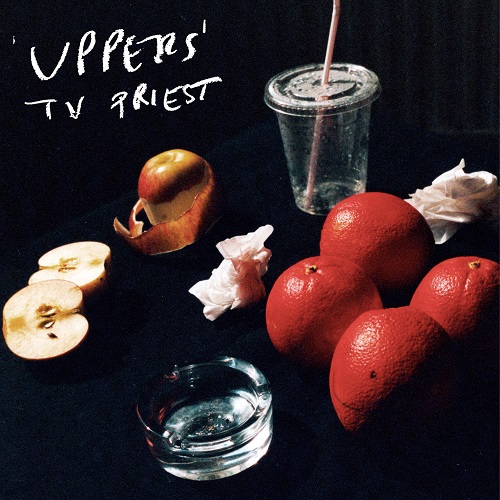|
(2021) TV Priest - Uppers
Review:
When IDLES’ Ultra Mono debuted at No. 1 last fall in the UK, it signaled the end of the current post-punk revival. But the sound of surly Brits armed with rich vocabularies and brawny rhythm sections is not going anywhere anytime soon. Rather, IDLES’ chart-topping coup confirmed that post-punk has evolved long past the point of needing to be revived. It isn’t merely an aesthetic that fades in and out of fashion every 20 years, but a permanent feature of the rock lexicon that, like hardcore or metal, will be sustained by future generations of malcontents in perpetuity. Still, it’s hard not to view TV Priest as the Stone Temple IDLES of this particular moment. On first approach, the London quartet ticks off all the boxes in the post-punk instruction manual. They’ve got a band name that sounds like it was cribbed from the cover of a Fall live bootleg. They wield a dissonant musical attack that shifts between motorik grooves and strobe-lit industrial clamor at regular intervals. And naturally, they’ve got a brash, melody-resistant frontman who deals in dystopian doublespeak and withering pop-cultural commentary, and who’s blessed with the perfect pubstool philosopher name of Charlie Drinkwater. But while TV Priest are so new to the party that they only got to play a single gig before COVID came around, their roots run deep. Drinkwater, guitarist Alex Sprogis, bassist/keyboardist Nic Bueth, and drummer Ed Kellan are all childhood friends who previously congregated in the early 2010s quintet Torches, a band that leaned toward the sleeker, more flamboyantly goth end of the post-punk spectrum. And more recently, Drinkwater’s day job as an art director has seen him produce cover art for indie peers like Fontaines D.C. and Sports Team. So what TV Priest bring to the table on their debut album, Uppers, isn’t just a deep familiarity with post-punk conventions, but a keen awareness of their limitations. In almost sequential fashion, the 12 tracks here capture a band trying to wiggle out of an aesthetic straitjacket one buckle at a time, evolving from a band you think you’ve heard a million times before into one you feel like you’re just getting to know. The TV Priest we meet at the album’s onset are punch-drunk on bull-in-a-china-shop bravado. Pitched somewhere between the slurred, stuttering sing-speak of Mark E. Smith and the gonzo braggadocio of Grinderman-era Nick Cave, Drinkwater unleashes a ceaseless stream of non-sequiturs about the media, consumerism, and narcissism that are a little too steeped in irony and too enamored with their own absurdity to function as cogent critiques. On “Leg Room,” Drinkwater rifles off a laundry list of increasingly silly indulgences (“I’m in love with a holographic representation of a singer we all used to know very well”; “I’m love with an animatronic dog”; “I’m in love with James Corden’s Carpool Karaoke”) that ultimately dilute and distract from the song’s breakneck thrust. And where tracks like “The Big Curve” and “Press Gang” get by on distortion-pedal dynamics and locomotive momentum alone, Drinkwater’s buckshot barrage of cryptic musings provide you with little to grab onto—melodically or conceptually—as the train goes barrelling by. But Uppers gradually reveals there’s more to this band than free-ranging rant‘n’roll. Initially inspired by Daniel Defoe’s namesake 1772 account of the bubonic plague in London, “Journal of a Plague Year” was actually written before our current pandemic, and the song’s uncanny prescience extends beyond the subject matter to its depiction of cold indifference in the face of abject horror. Over a disembodied bass loop and casually clattering beat, Drinkwater declares, “Hey buddy, normalize this”—a directive that seems all too easy to honor when coronavirus death tolls have become just another humdrum stat on the newsticker like weather forecasts and stock prices. “Powers of Ten” is equally unnerving in its restraint, presenting a portrait of craven, ladder-climbing corporatism that dials up the intensity of its synth-pierced drone, as if translating capitalism’s unsatiated appetite into a single oppressive, unrelenting sound. For all of TV Priest’s confrontational qualities, the band are ultimately less fuelled by a smash-the-system fervor than a self-effacing recognition that playing in a rock band probably won’t change the world. Amid the turbo-charged throttle of “Slideshow,” Drinkwater sheepishly admits, “Well, all I can do is talk”—ironically, one of the few moments on this record where he actually sings—before adding, “I probably never had an original thought.” Instead, he leaves us with a reminder that the most direct path to a brighter future begins at home. On Uppers’ epic seven-minute closer “Saintless,” he drops the acerbic color commentary and pint-glass-smashing aggression for an exhilarating, open-hearted anthem dedicated to his wife and child. “This world is dark, with saintless few/So guard your love, but give it too,” Drinkwater croons defiantly through a haze of fuzzy propulsion, rendering the song as an “All My Friends” that isn’t so much lamenting lost youth as embracing new parenthood, bottling up both the optimism and insecurities of becoming a father in an age of perpetual political and psychological stress. Never mind the post-punk; TV Priest are redefining dad-rock.

Tracklist:
01 - The Big Curve
02 - Press Gang
03 - Leg Room
04 - Journal of a Plague Year
05 - History Week
06 - Decoration
07 - Slideshow
08 - Fathers and Sons
09 - the ref
10 - Powers of Ten
11 - This Island
12 - Saintless
Media Report:
Genre: indie-rock, post-punk
Format: FLAC
Format/Info: Free Lossless Audio Codec, 16-bit PCM
Bit rate mode: Variable
Channel(s): 2 channels
Sampling rate: 44.1 KHz
Bit depth: 16 bits |

